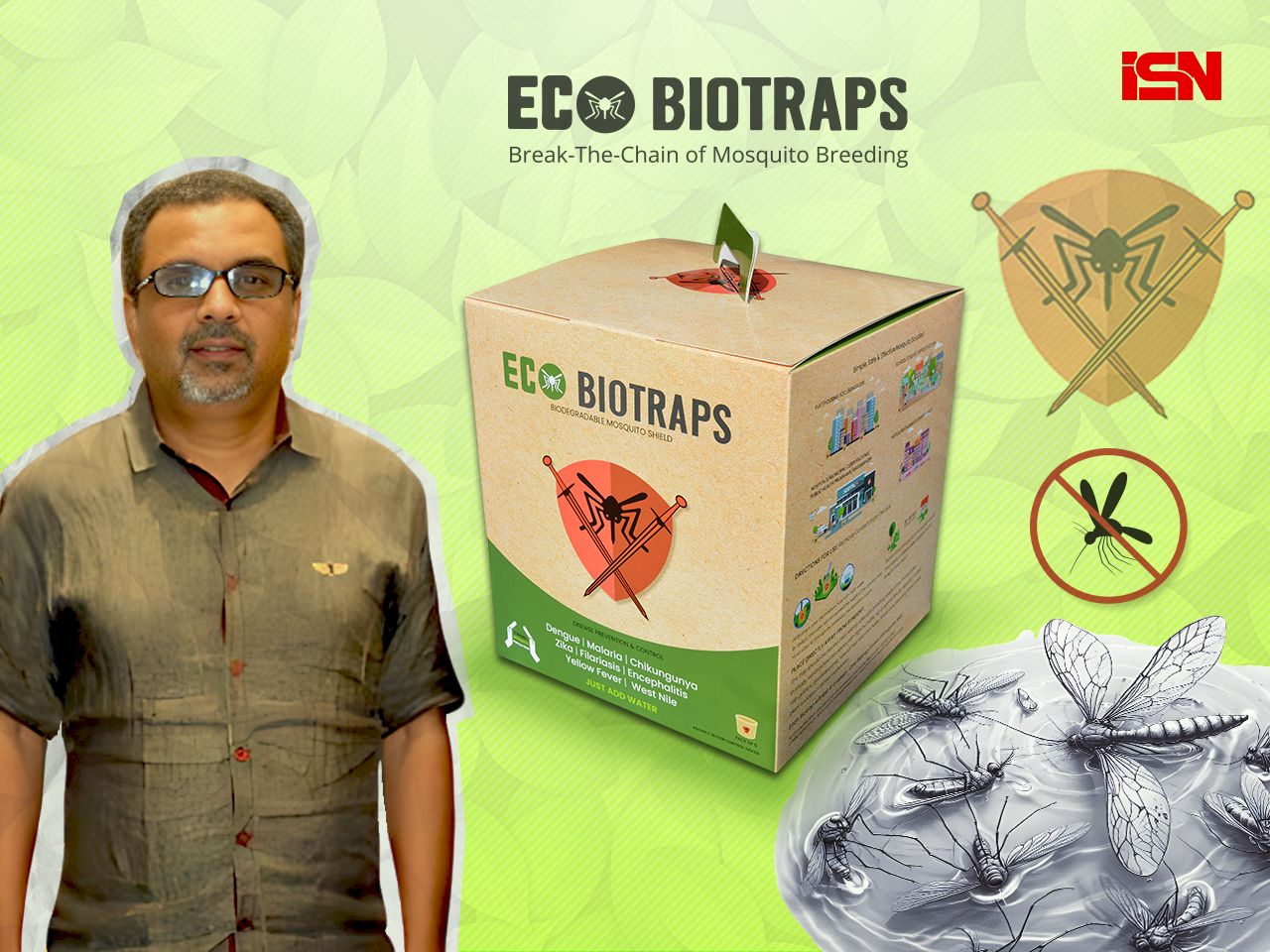In a country plagued by mosquito-borne diseases, India faces a daunting challenge. Each year, millions of cases of diseases like dengue, malaria, and chikungunya are reported, posing a significant threat to public health.
Mosquitoes, particularly the disease-carrying females, have quietly thrived, leaving behind a trail of suffering and health crises. Shockingly, a single mosquito bite can set in motion a chain reaction, resulting in an astonishing 31 million more mosquitoes.
To solve this problem, Prasad Phadke, a tech industry veteran with over two decades of experience, launched Eco BioTraps (EBT), a for-profit social enterprise with a mission to combat this deadly predator.
The startup is making a significant impact in the realms of public health and environmental conservation by following an innovative approach that seamlessly blends eco-friendly solutions with public health strategies to disrupt the mosquito breeding cycle, effectively preventing diseases like dengue, malaria, chikungunya, and more.
The pivotal moment came during a meal in San Francisco, where the prevalence of mosquitoes despite technological advances caught their attention. The presence of West Nile virus cases underscored the urgency of finding an innovative and sustainable solution.
Recognizing the need to break the chain of mosquito-borne diseases, Prasad and his team embarked on a mission to create a device tailored for tropical regions where these diseases are rampant. Their goal was to develop a sustainable way to disrupt the mosquito breeding cycle, thus curbing disease incidence.
After two years of intensive research and collaboration with entomologists, they launched Eco BioTraps.
What is EBT?
EBT is a population reduction device designed to break the mosquito breeding chain and prevent diseases like dengue, malaria, chikungunya, zika, and other vector-borne illnesses. The device’s development was grounded in scientific rigour and gained validation from top entomologists worldwide.
Eco BioTraps is more than just a startup; it’s a for-profit social enterprise that skillfully balances two critical goals: environmental sustainability and public health improvement. Their core mission revolves around recycling waste, specifically corrugated boxes, to create biodegradable traps designed to disrupt the mosquito breeding cycle.
This dual approach embodies their social impact goals, making a positive difference in environmental conservation and community well-being. To date, The startup claims that its has saved 940,000 lives, reduced carbon emissions by 170 metric tonnes, and diverted 66 square feet of landfill.
EBT’s technology zeroes in on female mosquitoes, the disease transmitters. These females live only for 15 to 30 days and breed in water, laying up to 1,000 eggs in their lifetime. Astonishingly, one mosquito bite can lead to 31 million more mosquitoes. EBT’s mission is to halt this multiplication.
The key components of Eco BioTraps include biodegradable containers made from recycled corrugated boxes, a natural attractant derived from plant-based animal food, and an Indian government-approved household insecticide known as Insect Growth Regulators (IGRs) as the cidal ingredient. These IGRs disrupt mosquito development, preventing adult mosquitoes from emerging and breaking the breeding chain.
How to use EBT?
Using EBT is easy; simply add water, place it away from direct sunlight, and replace it every 4 weeks. This eco-friendly solution has the potential to revolutionize mosquito control by effectively disrupting the breeding cycle.
Eco BioTraps has already established a presence in multiple Indian cities, with offices in Ahmedabad, Mumbai, Delhi, and manufacturing in Pune. To tackle the challenge of affordability and accessibility in India, The startup has partnered with Rentokil PCI, one of the country’s and the world’s largest pest control operators.
Moreover, It has garnered interest from other countries like Nepal, Malaysia, and other tropical regions.
Individuals, communities, and organizations can actively contribute to Eco BioTraps’ mission. By adopting Eco BioTraps in their homes and localities, individuals become proactive participants in controlling mosquito populations, aligning with the vision of malaria and dengue-free India.
Volunteers can also join Eco BioTraps to spread awareness about mosquito-borne diseases and the importance of utilizing eco-friendly traps. Organizations can offer support through partnerships or funding initiatives, bolstering research, deployment efforts, or awareness campaigns. Advocacy plays a crucial role; individuals and organizations can champion policies promoting eco-friendly mosquito control methods, influencing public opinion and policy decisions.
Eco BioTraps’ focus is clear: saving lives from mosquito-borne diseases. They aim to extend the usage of their product from 4 weeks to 12 weeks and expand internationally. One of their papers, “Dharavi,” has been published in the American Society for Tropical Medicine and Health, paving the way for global expansion.
As with any venture, challenges arise on the path to expansion. However, Eco BioTraps seems confident about overcoming them. Their partnership with Rentokil PCI, a giant in the pest control industry, is expected to play a vital role in making their innovative solution widely available.
In conclusion, their innovative biodegradable traps represent a beacon of hope in the fight against mosquito-borne diseases. With a visionary leader like Prasad Phadke at the helm, Eco BioTraps continues to make strides toward malaria and dengue-free India.
They’ve successfully created a solution that balances social impact with eco-friendly technology. Their media recognition highlights the real-world impact they’ve achieved in communities, especially in challenging environments like Dharavi.
The scalability of their operations and their international expansion plans demonstrate that Eco BioTraps is a venture with a global perspective.
Join our new WhatsApp Channel for the latest startup news updates
Disclaimer
We strive to uphold the highest ethical standards in all of our reporting and coverage. We StartupNews.fyi want to be transparent with our readers about any potential conflicts of interest that may arise in our work. It’s possible that some of the investors we feature may have connections to other businesses, including competitors or companies we write about. However, we want to assure our readers that this will not have any impact on the integrity or impartiality of our reporting. We are committed to delivering accurate, unbiased news and information to our audience, and we will continue to uphold our ethics and principles in all of our work. Thank you for your trust and support.



![[CITYPNG.COM]White Google Play PlayStore Logo – 1500×1500](https://startupnews.fyi/wp-content/uploads/2025/08/CITYPNG.COMWhite-Google-Play-PlayStore-Logo-1500x1500-1-630x630.png)